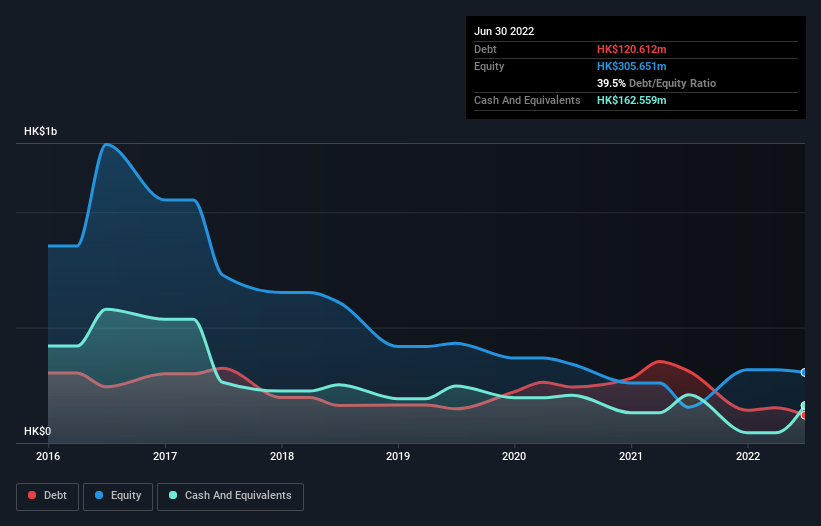Is Hang Tai Yue Group Holdings (HKG:8081) Using Debt In A Risky Way?
Legendary fund manager Li Lu (who Charlie Munger backed) once said, 'The biggest investment risk is not the volatility of prices, but whether you will suffer a permanent loss of capital.' When we think about how risky a company is, we always like to look at its use of debt, since debt overload can lead to ruin. We note that Hang Tai Yue Group Holdings Limited (HKG:8081) does have debt on its balance sheet. But the real question is whether this debt is making the company risky.
What Risk Does Debt Bring?
Debt is a tool to help businesses grow, but if a business is incapable of paying off its lenders, then it exists at their mercy. Ultimately, if the company can't fulfill its legal obligations to repay debt, shareholders could walk away with nothing. However, a more frequent (but still costly) occurrence is where a company must issue shares at bargain-basement prices, permanently diluting shareholders, just to shore up its balance sheet. By replacing dilution, though, debt can be an extremely good tool for businesses that need capital to invest in growth at high rates of return. The first thing to do when considering how much debt a business uses is to look at its cash and debt together.
View our latest analysis for Hang Tai Yue Group Holdings
What Is Hang Tai Yue Group Holdings's Debt?
As you can see below, Hang Tai Yue Group Holdings had HK$120.6m of debt at June 2022, down from HK$311.9m a year prior. However, it does have HK$162.6m in cash offsetting this, leading to net cash of HK$41.9m.

How Healthy Is Hang Tai Yue Group Holdings' Balance Sheet?
The latest balance sheet data shows that Hang Tai Yue Group Holdings had liabilities of HK$227.0m due within a year, and liabilities of HK$59.5m falling due after that. Offsetting this, it had HK$162.6m in cash and HK$11.7m in receivables that were due within 12 months. So it has liabilities totalling HK$112.3m more than its cash and near-term receivables, combined.
Of course, Hang Tai Yue Group Holdings has a market capitalization of HK$565.6m, so these liabilities are probably manageable. But there are sufficient liabilities that we would certainly recommend shareholders continue to monitor the balance sheet, going forward. While it does have liabilities worth noting, Hang Tai Yue Group Holdings also has more cash than debt, so we're pretty confident it can manage its debt safely. There's no doubt that we learn most about debt from the balance sheet. But it is Hang Tai Yue Group Holdings's earnings that will influence how the balance sheet holds up in the future. So when considering debt, it's definitely worth looking at the earnings trend. Click here for an interactive snapshot.
In the last year Hang Tai Yue Group Holdings had a loss before interest and tax, and actually shrunk its revenue by 33%, to HK$1.0b. That makes us nervous, to say the least.
So How Risky Is Hang Tai Yue Group Holdings?
Although Hang Tai Yue Group Holdings had an earnings before interest and tax (EBIT) loss over the last twelve months, it made a statutory profit of HK$114m. So taking that on face value, and considering the cash, we don't think its very risky in the near term. With revenue growth uninspiring, we'd really need to see some positive EBIT before mustering much enthusiasm for this business. When analysing debt levels, the balance sheet is the obvious place to start. But ultimately, every company can contain risks that exist outside of the balance sheet. We've identified 2 warning signs with Hang Tai Yue Group Holdings (at least 1 which is concerning) , and understanding them should be part of your investment process.
If, after all that, you're more interested in a fast growing company with a rock-solid balance sheet, then check out our list of net cash growth stocks without delay.
Valuation is complex, but we're here to simplify it.
Discover if Hang Tai Yue Group Holdings might be undervalued or overvalued with our detailed analysis, featuring fair value estimates, potential risks, dividends, insider trades, and its financial condition.
Access Free AnalysisHave feedback on this article? Concerned about the content? Get in touch with us directly. Alternatively, email editorial-team (at) simplywallst.com.
This article by Simply Wall St is general in nature. We provide commentary based on historical data and analyst forecasts only using an unbiased methodology and our articles are not intended to be financial advice. It does not constitute a recommendation to buy or sell any stock, and does not take account of your objectives, or your financial situation. We aim to bring you long-term focused analysis driven by fundamental data. Note that our analysis may not factor in the latest price-sensitive company announcements or qualitative material. Simply Wall St has no position in any stocks mentioned.
About SEHK:8081
Hang Tai Yue Group Holdings
An investment holding company, engages in the hospitality and related services, money lending, and assets investments businesses in Hong Kong and Australia.
Excellent balance sheet with low risk.
Market Insights
Weekly Picks


Crazy Undervalued 42 Baggers Silver Play (Active & Running Mine)


Fiducian: Compliance Clouds or Value Opportunity?

Willamette Valley Vineyards (WVVI): Not-So-Great Value
Recently Updated Narratives


Positioned globally, partnered locally


When will fraudsters be investigated in depth. Fraud was ongoing in France too.


Staggered by dilution; positions for growth
Popular Narratives


MicroVision will explode future revenue by 380.37% with a vision towards success


NVDA: Expanding AI Demand Will Drive Major Data Center Investments Through 2026





